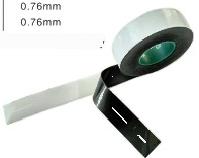The Essential Guide to PVC Tape for Electrical Wires
In the realm of electrical work, safety and reliability are paramount. One of the key materials that contribute to both is PVC tape, widely known for its practicality and efficiency in insulating electrical wires. This versatile tool serves a critical role in various electrical applications, and understanding its properties and uses can help ensure a safe work environment.
What is PVC Tape?
Polyvinyl chloride (PVC) tape is a type of adhesive tape made from a synthetic plastic polymer. It is characterized by its durability, flexibility, and resistance to moisture, chemicals, and abrasion. These features make PVC tape particularly well-suited for electrical applications, where it is essential to insulate wires, prevent electrical shocks, and minimize the risk of short circuits.
Types of PVC Tape
There are several types of PVC tape designed for different electrical tasks. The most common types include
1. Insulating Tape This is the standard variety used for insulating electrical wires. Typically black, insulating tape prevents electrical leakage and protects against short circuits.
2. Colored PVC Tape Available in a spectrum of colors, this tape is often used for color-coding wires to differentiate between different circuits or phases. This is particularly useful in complex wiring systems to enhance safety and organization.
3. Electrical Splicing Tape Engineered with extra-thick PVC and special adhesives, electrical splicing tape is used for insulating and protecting splices or connections in electrical wires.
Key Benefits of Using PVC Tape
pvc tape for electrical wires

1. Excellent Insulation PVC tape offers exceptional electrical insulation properties, effectively preventing current leakage and protecting both the user and the equipment from electrical shocks.
2. Weather Resistance Many PVC tapes are designed to withstand harsh weather conditions, making them ideal for both indoor and outdoor applications. Their moisture resistance prevents deterioration, ensuring longevity.
3. Flexibility and Conformability The flexibility of PVC tape allows it to mold to various shapes and surfaces, ensuring a snug fit around wires and connections. This is critical for maintaining effective insulation.
4. Ease of Use PVC tape is lightweight and easy to handle. It can be torn by hand for convenience and applied quickly without the need for additional tools, making it accessible for both professionals and DIY enthusiasts.
Practical Applications
PVC tape is utilized in a myriad of applications beyond just electrical insulation. It can be employed for
- Bundling Wires Keeping wires together neatly to prevent tangling and potential hazards. - Securing Connections Ensuring that all electrical connections are properly secured and insulated. - Labeling Color-coded PVC tapes can be used to label wires, making identification easier and safer during maintenance or upgrades.
Safety Considerations
While PVC tape is an excellent choice for electrical insulation, it is crucial to follow safety guidelines during application. Always ensure that the power is turned off before working with electrical wires. Additionally, the tape must be applied without stretching too tightly or wrapping in a manner that may compromise its integrity. Regular inspections can help identify any wear or damage, ensuring ongoing safety.
Conclusion
PVC tape is a vital component in the toolkit of anyone involved in electrical work. Its insulating properties, weather resistance, and ease of use make it indispensable for safe and effective electrical installations. Whether you are a seasoned electrician or a novice tackling a home project, understanding the features and benefits of PVC tape will enhance your ability to work safely and efficiently. In the world of electrical wiring, having the right materials at your disposal, particularly PVC tape, can make all the difference. Always prioritize safety, and remember that the right tape can help ensure that your electrical projects stand the test of time.
-
XIANGFAN Rubber Tape-Ultimate Solutions for All Your Insulation NeedsNewsJun.24,2025
-
XIANGFAN Rubber Tape-Protection for Industrial and Residential ApplicationsNewsJun.24,2025
-
XIANGFAN Rubber Tape: Superior Safety and Sealing for Demanding EnvironmentsNewsJun.24,2025
-
XIANGFAN Rubber Tape: Reliable Solutions for Every Electrical ChallengeNewsJun.24,2025
-
XIANGFAN Electrical & Industrial Tape: Powering Reliability Across IndustriesNewsJun.24,2025
-
XIANGFAN Electrical & Industrial Tape: Excellence in Every ApplicationNewsJun.24,2025
